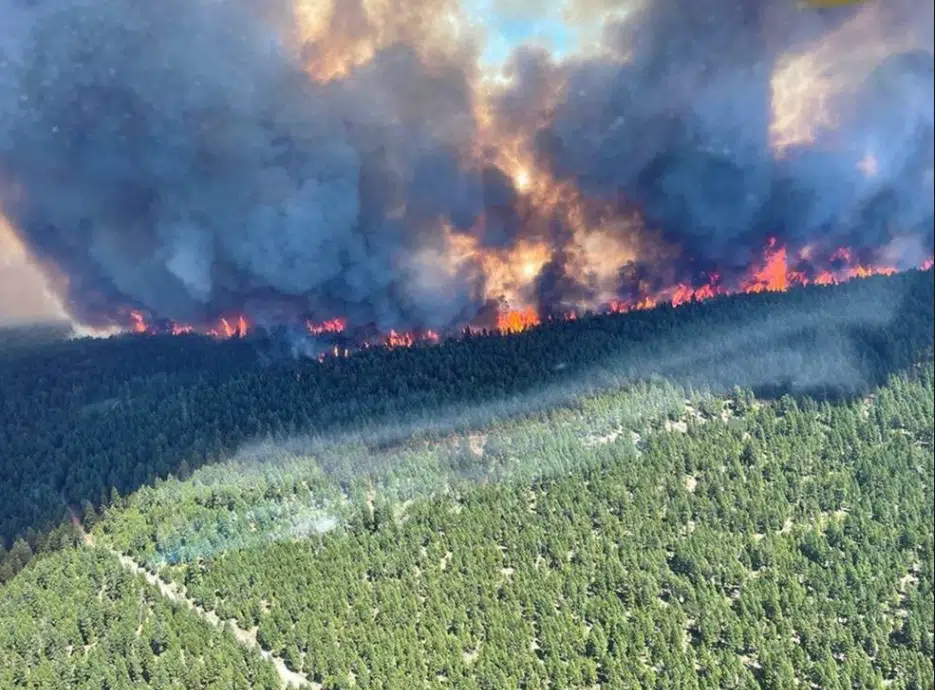
Sparks Lake Fire on June 29. Photo via BC Wildfire Service
The Mayor of Barriere says people in the Southern Interior are one significant lightning storm away from this wildfire season being worse than anything currently on record.
Speaking on the NL Morning News, Ward Stamer, says conditions this fire season are drier than it was 18 years ago in 2003 when homes and businesses were destroyed by a wildfire in Barriere and McLure
“If we have another lightning storm that comes through the Interior, that’s what I’m concerned about and that’s what I was trying to relate to my colleagues at the TNRD, that I’ve been here. I’ve seen it,” he said.
“I’m not trying to scare anybody but if Mother Nature decides if she wants to give us a whole bunch of lightning without a bunch of rain, it could be far worse than it was in 2003.”
Stamer says the Barriere Fire Department has gone through the town again preparing for whatever lies ahead.
“We’ve looked at our perimeters. We’ve looked at potential spots that could bite us and we’re ready,” he added. “I’m sure all the other communities are in the same boat.”
“I talked to Mayor [Merlin] Blackwell in Clearwater, same thing. 100 Mile House you know was on evacuation alert. Talked to Mayor [Mitch] Campsall too. We’re all ready for it, just we’re having to hurry up and wait, hoping Mother Nature doesn’t turn on us.”
In voting in favour of asking the province to declare a provincial state of emergency, Stamer says he does not think some people truly understand what’s going on the wildfire front in B.C.
“I still believe that we’ll be able to get through this, its just that we have to cognizant of it. Look at what happened in Juniper two weeks ago,” he said. “It’s kind of important to have these looks back and say, ‘you know what, we need more than one route in and one route out.'”
“And I’m sure that people were pretty nervous about what happened there and it can happen again.”
Meanwhile, the Mayor of Ashcroft, some two hours away from Barriere, also tells NL News she sees some similarities between the 2017 wildfire season and this current year.
While 2017 was a difficult fire season in itself, Barbara Roden says a big difference this year is the number of aggressive fires already currently burning in the region.
“I was certainly here in the thick of it in 2017. Obviously further up north, Williams Lake, 100 Mile, 108 Mile, that was different back then. But in this area it was the Elephant Hill wildfire. There were not all these subsidiary fires all around and this year, its very different in that respect,” Roden said.
“We’re seeing so many different fires.”
Around Ashcroft, there is the Tremont Creek fire to the east, the McKay Creek fire to the northwest, the massive Sparks Lake fire to the northeast, and the Lytton Creek fire to the southwest to name a few.
“What happened in Lytton is top of people’s minds right now, sadly, and we’ve seen how incredibly destructive fire can be. We saw it in 2017, and we’ve seen it already now and we’re only halfway through July,” Roden said, noting residents in Boston Flats, Loon Lake, and Pressy Lake went through that same experience in 2017 when their homes and businesses burned down because of the Elephant Hill wildfire.
The B.C. government declared a provincial state of emergency in 2017 and again in 2018, and pressure has been mounting on the government to do the same again this year.
Kevin Boon, the General Manager of the BC Cattlemen’s Association, told NL News the 2021 fire season is “2017 on steroids” adding he is concerned about what the situation is doing to available feed.
“We’re going to save our cattle from the fire only to have them starve to death over the winter because we have no hay and grass for them to feed. The fires and the intensity of them is taking out a lot of that resource on top and we’re really at a crisis for our industry on many levels, but it’s an environmental catastrophe as well,” he said.
“For Ranchers, their cattle are what they depend on to bring the income, but the land is what they depend on in order to be able to do that.”
Clearwater Mayor Merlin Blackwell also told NL News the provincial government needs to act right now, instead of trying to play catch up in the future.
“I know the B.C. Government has said that everything they’ve asked for has been given to them at this point but there are extra resources through contractors who can’t really be broken free of their day jobs until a provincial state of emergency is declared,” he said.
“We may have the resources that we think we need right but with this long range forecast, I would rather be prepared.”
– With files from Jeff Andreas














